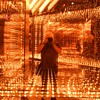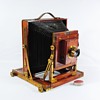Posted 10 years ago
 rniederman
rniederman
(350 items)
In an established photography market dominated by the big players (American Optical, E. & H.T. Anthony, Scovill & Adams, Thomas Blair, George Eastman and Simon Wing), a lone inventor, Jacob Schaub, created his own interpretation of a multiplying camera. It's unclear why he made the effort; maybe existing designs didn't meet his needs; maybe he needed something less expensive - we don't know.
Three complete examples of Schaub cameras are known, one of which resides in the George Eastman Museum collection. Two match the 1900 patent for 24 exposures on a single plate. The third example posted here is the only known version capable of making an impressive 30 separate images on a 4 x 5 inch glass plate.
All of Schaub's multiplying cameras have a tall front panel that is a fixed distance from the rear assembly. A rack and pinion focusing knob moves a simple brass tube lens back and forth. While other builders used pleated bellows and scaled up camera bodies for extreme shifting movements (i.e. very wide backs that were also tall), Jacob Schaub made a simple bag bellows of rubberized cloth or leather. This might be the key reason for this camera because it creates a smaller overall body size that allows extreme shifting to cover a 4 x 5 inch glass plate with 30 small images.
Making 30 exposures in a 5 x 6 array requires special hardware so that the entire area of the plate can be used without overlapping individual pictures. To demonstrate the extreme movements, the camera is shown (second picture) with its back adjusted for exposing the lower right portion of the plate.
The key to achieving this is a novel registration system. Special brass hardware slides inside u-shaped brass channels (third picture). The number of exposures corresponds to the numbers on the brass slide and a pin registration system. As shown, the camera can be set up to shoot 6, 12, 15, 20, 24, or 30 images.
The story of Jacob Schaub is quite interesting and was researched in detail by the great photographica collector Mike Kessler. In the 1980s, Mike tracked down and interviewed Jacob’s son Berkley who recounted a fascinating story about his father meeting George Eastman:
***********
"Because of his photographic developments, possibly the multiple-image camera, and especially the plate holder patents, the Eastman Kodak Co. sent a representative to see him in Logan, Utah. He was then told pretty cold turkey that Kodak would not brook such local competition and as a result of this he made a trip to see them in Rochester, N.Y. It is possible Kodak paid his expenses because there was always such a money problem, I do not know where the funds would have come from otherwise. (His father had been killed when a horse bolted crossing a bridge after they moved to Logan and the family was really left destitute while the three sons were still in their teens ... but this is another story.
At any rate, he did not like the attitude of Kodak and of Mr. Eastman in Rochester and he decided to pack up and go home, also suffering from homesickness. He was most anxious to know about his patented plate holder, which Kodak obviously liked and wanted. He tried unsuccessfully to see Mr. Eastman about this, and finally contrived to wait outside of the executive's men's room until the big man himself came to use it. When Eastman was leaving the men's room my father accosted him, demanding to know what was to be done about the plate holder patents.
Eastman replied immediately they would pay my father $1000 for the U.S. patent, which upset my father, who then demanded to know about the foreign patents. My father said that Eastman then replied: "Oh, those ... we'll simply go ahead and use them. If you've got the guts to fight me, go ahead!"
My father left in high dudgeon and went immediately to a lawyer in Rochester. This lawyer told him that fighting Kodak was virtually hopeless, that "no one has ever won a suit against them" ... and that in order to take on the case he would have to ask a fairly high retainer's fee, which of course was completely beyond my father's means. In bitter disappointment and anger he returned to Utah."
***********
And there you have it, an entrepreneur in Logan, Utah (that's right ... Utah ... hundreds of miles from the epicenter of east coast camera makers) attempting to go it on his own. The result was a short-lived, intriguing multiplying camera design unlike any other.































very very beautiful Rob !!!!
Thanks!
aghcollect
vetraio50
Sean
Says a lot about Kodak's early working methods.
You're lucky to have such a rare camera in your collection!
Great story behind it; a good example of the shortcomings of the patent system.
The patent system works in favor of those with the most money & the best lawyers.
Thanks!
Manikin
David
Eric
fortapache
Thanks!
Michael
GeodeJem
Thanks!
paulmartin
captainslack
John K.
Thanks, Nordicman32!
Thanks!
surfdub66
Manikin
Alan2310
Thanks!
Roycroftbooksfromme1
BinaryReflex
Great post as always.
Thanks, mcheconi!
Thanks!
AnnaB
SpiritBear
f311
Thanks, Camera_turk!
Was just wondering IF you could look at this CW post -- and see if ?? it has anything to do with older camera? I am not sure......Thanks
http://www.collectorsweekly.com/stories/180144-mystery-box
Hi antiquerose ... I looked very carefully at the item and thought a lot about possible uses in photography. I posted comments. In summary, I could not find anything similar in the photographic workflow (set up to camera to darkroom to display) that might use it. Thanks for bringing it to my attention. - Rob